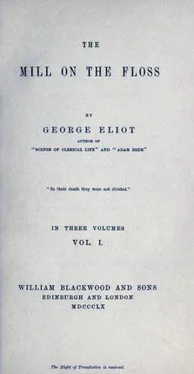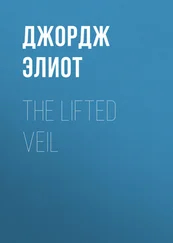"What for?"
"You never mind what for. Shut 'em when I tell you."
Maggie obeyed.
"Now, which'll you have, Maggie, — right hand or left?"
"I'll have that with the jam run out," said Maggie, keeping her eyes shut to please Tom.
"Why, you don't like that, you silly. You may have it if it comes to you fair, but I sha'n't give it you without. Right or left, — you choose, now. Ha-a-a!" said Tom, in a tone of exasperation, as Maggie peeped. "You keep your eyes shut, now, else you sha'n't have any."
Maggie's power of sacrifice did not extend so far; indeed, I fear she cared less that Tom should enjoy the utmost possible amount of puff, than that he should be pleased with her for giving him the best bit. So she shut her eyes quite close, till Tom told her to "say which," and then she said, "Left hand."
"You've got it," said Tom, in rather a bitter tone.
"What! the bit with the jam run out?"
"No; here, take it," said Tom, firmly, handing, decidedly the best piece to Maggie.
"Oh, please, Tom, have it; I don't mind — I like the other; please take this."
"No, I sha'n't," said Tom, almost crossly, beginning on his own inferior piece.
Maggie, thinking it was no use to contend further, began too, and ate up her half puff with considerable relish as well as rapidity. But Tom had finished first, and had to look on while Maggie ate her last morsel or two, feeling in himself a capacity for more. Maggie didn't know Tom was looking at her; she was seesawing on the elder-bough, lost to almost everything but a vague sense of jam and idleness.
"Oh, you greedy thing!" said Tom, when she had swallowed the last morsel. He was conscious of having acted very fairly, and thought she ought to have considered this, and made up to him for it. He would have refused a bit of hers beforehand, but one is naturally at a different point of view before and after one's own share of puff is swallowed.
Maggie turned quite pale. "Oh, Tom, why didn't you ask me?"
"I wasn't going to ask you for a bit, you greedy. You might have thought of it without, when you knew I gave you the best bit."
"But I wanted you to have it; you know I did," said Maggie, in an injured tone.
"Yes, but I wasn't going to do what wasn't fair, like Spouncer. He always takes the best bit, if you don't punch him for it; and if you choose the best with your eyes shut, he changes his hands. But if I go halves, I'll go 'em fair; only I wouldn't be a greedy."
With this cutting innuendo, Tom jumped down from his bough, and threw a stone with a "hoigh!" as a friendly attention to Yap, who had also been looking on while the eatables vanished, with an agitation of his ears and feelings which could hardly have been without bitterness. Yet the excellent dog accepted Tom's attention with as much alacrity as if he had been treated quite generously.
But Maggie, gifted with that superior power of misery which distinguishes the human being, and places him at a proud distance from the most melancholy chimpanzee, sat still on her bough, and gave herself up to the keen sense of unmerited reproach. She would have given the world not to have eaten all her puff, and to have saved some of it for Tom. Not but that the puff was very nice, for Maggie's palate was not at all obtuse, but she would have gone without it many times over, sooner than Tom should call her greedy and be cross with her. And he had said he wouldn't have it, and she ate it without thinking; how could she help it? The tears flowed so plentifully that Maggie saw nothing around her for the next ten minutes; but by that time resentment began to give way to the desire of reconciliation, and she jumped from her bough to look for Tom. He was no longer in the paddock behind the rickyard; where was he likely to be gone, and Yap with him? Maggie ran to the high bank against the great holly-tree, where she could see far away toward the Floss. There was Tom; but her heart sank again as she saw how far off he was on his way to the great river, and that he had another companion besides Yap, — naughty Bob Jakin, whose official, if not natural, function of frightening the birds was just now at a standstill. Maggie felt sure that Bob was wicked, without very distinctly knowing why; unless it was because Bob's mother was a dreadfully large fat woman, who lived at a queer round house down the river; and once, when Maggie and Tom had wandered thither, there rushed out a brindled dog that wouldn't stop barking; and when Bob's mother came out after it, and screamed above the barking to tell them not to be frightened, Maggie thought she was scolding them fiercely, and her heart beat with terror. Maggie thought it very likely that the round house had snakes on the floor, and bats in the bedroom; for she had seen Bob take off his cap to show Tom a little snake that was inside it, and another time he had a handful of young bats: altogether, he was an irregular character, perhaps even slightly diabolical, judging from his intimacy with snakes and bats; and to crown all, when Tom had Bob for a companion, he didn't mind about Maggie, and would never let her go with him.
It must be owned that Tom was fond of Bob's company. How could it be otherwise? Bob knew, directly he saw a bird's egg, whether it was a swallow's, or a tomtit's, or a yellow-hammer's; he found out all the wasps' nests, and could set all sort of traps; he could climb the trees like a squirrel, and had quite a magical power of detecting hedgehogs and stoats; and he had courage to do things that were rather naughty, such as making gaps in the hedgerows, throwing stones after the sheep, and killing a cat that was wandering incognito.
Such qualities in an inferior, who could always be treated with authority in spite of his superior knowingness, had necessarily a fatal fascination for Tom; and every holiday-time Maggie was sure to have days of grief because he had gone off with Bob.
Well! there was no hope for it; he was gone now, and Maggie could think of no comfort but to sit down by the hollow, or wander by the hedgerow, and fancy it was all different, refashioning her little world into just what she should like it to be.
Maggie's was a troublous life, and this was the form in which she took her opium.
Meanwhile Tom, forgetting all about Maggie and the sting of reproach which he had left in her heart, was hurrying along with Bob, whom he had met accidentally, to the scene of a great rat-catching in a neighboring barn. Bob knew all about this particular affair, and spoke of the sport with an enthusiasm which no one who is not either divested of all manly feeling, or pitiably ignorant of rat-catching, can fail to imagine. For a person suspected of preternatural wickedness, Bob was really not so very villanous-looking; there was even something agreeable in his snub-nosed face, with its close-curled border of red hair. But then his trousers were always rolled up at the knee, for the convenience of wading on the slightest notice; and his virtue, supposing it to exist, was undeniably "virtue in rags," which, on the authority even of bilious philosophers, who think all well-dressed merit overpaid, is notoriously likely to remain unrecognized (perhaps because it is seen so seldom).
"I know the chap as owns the ferrets," said Bob, in a hoarse treble voice, as he shuffled along, keeping his blue eyes fixed on the river, like an amphibious animal who foresaw occasion for darting in. "He lives up the Kennel Yard at Sut Ogg's, he does. He's the biggest rot-catcher anywhere, he is. I'd sooner, be a rot-catcher nor anything, I would. The moles is nothing to the rots. But Lors! you mun ha' ferrets. Dogs is no good. Why, there's that dog, now!" Bob continued, pointing with an air of disgust toward Yap, "he's no more good wi' a rot nor nothin'. I see it myself, I did, at the rot-catchin' i' your feyther's barn."
Читать дальше












